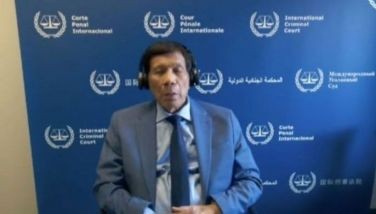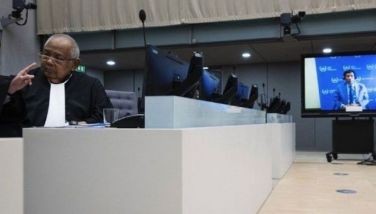Just bear it

July 31, 2004 | 12:00am
We’re behaving like Shakespeare’s lady doth protests too much.
When Jay Leno poked fun at the hurried withdrawal of our humanitarian mission to Iraq in order to free a Filipino hostage, we all raised a howl. Every political group and personality sought to score domestic political points by publicly taking issue with the American comedian. One militant group put out a statement making the absurd demand that Leno apologize to the nation.
When the US secretary of state described our withdrawal as a "disappointment", our politicians began a useless litany about how old the military equipment we got from the US was. The stronger the criticism we received from editorials the world over, the more we stretched that agonizing excuse we had for caving in to terrorist demands.
When Australian foreign minister Alexander Downer said we "encouraged" terrorism by yielding to terrorist demands, the DFA summoned the Australian ambassador to give our government an explanation.
Senator Joker Arroyo took to the Senate floor and delivered an elaborate treatise about how we saved Australia from the Japanese imperial army during the Second World War by waging a courageous resistance that disrupted Tokyo’s timetable for war. This is like saying that we should be constantly tolerant of every French diplomatic decision because they stopped at Poitiers the Moorish invasion of Europe centuries ago, and by doing so saved western civilization.
When one American diplomat, after the President delivered her State of the Nation Address, made the necessary distinction between "international acclaim" and "international commitment", he took flak from our own editorial commentators. I thought that decision he drew was fair.
We are overexerting ourselves parrying every adverse comment of what is, without doubt, a controversial decision. There is a danger to that.
The first danger is that we needlessly pick diplomatic fights with governments who have been reliable allies and good friends. We magnify the adverse consequences of a difficult policy decision we took on the Angelo de la Cruz affair.
We add poison to otherwise robust diplomatic relations by our bitter counterattacks to legitimate criticism of our action. We dig ourselves deeper into the hole of political isolation from the confederacy of democratic states.
At this stage, we ought not to be picking petty fights with our friends aggrieved by our waffling in the face of terror. We should in fact be busy repairing damages fences and reassuring our allies.
Furthermore, we open the window wider for our politicians to make confused and confusing statements.
Etta Rosales of Akbayan comes to mind.
Last week, she was on television saying something that seemed profound at first glance. She said the Philippines ought to strive to expand our diplomatic ties with the nations of West Asia such as Iran. She said this in the context of compensating for our damaged relations with traditional allies.
That might seem to be a sound suggestion, albeit a redundant one. One of the key missions of our foreign service is, of course, to develop diplomatic relations with everybody.
Either she is being redundant or Etta is saying something else: that we should substitute closer diplomatic ties with Iran for the eroded ties we have with, say, the US, Britain and Australia.
Now that is a dangerous thing to say. Iran is run by a medieval theocracy that is oppressive and regressive. It is a milder version of the unlamented Taliban regime that once ruled Afghanistan. The tensions between tradition and modernity are building up in this nation faster than anywhere else, setting the stage for a conflagration.
Too, Iran is probably hosting fundamentalist groups indulging in international terrorism – the scourge we are precisely trying to combat, not only as a matter of international commitment but national interest in securing our society.
I don’t think we should even think of substituting an alliance with Iran for the standing alliance with, say, Australia – a mature democracy with values we share and a dynamic economy that supports our own development.
Which brings us to the second, more important, reason why we should not be exerting too much effort parrying the criticism of our friends: It distorts our own public’s appreciation of the moral, diplomatic and strategic considerations bearing on the issue at hand.
The Angelo de la Cruz incident, like the Contemplacion incident before, is yet another highly emotional seizure that our society has proven itself vulnerable to. During such seizures, our citizens could not see beyond their own bleeding hearts. Our perspectives narrow dramatically and we lose sight of the horizon.
Fortunately, such seizures are intense but transient.
The seizures become a fit when political opportunists jump on the bandwagon of public sentimentalism and fuel misplaced passions to score political points. The opportunists demonize our true friends and rehabilitate our true enemies.
But the seizures soon pass and sobriety sets in. When we are sober, we are likely to look more intelligently at the future.
The de la Cruz affair, like the Contemplacion incident, skewed our calculations of the national interest. That has been aggravated by the permanently skewed minds of our own militants and rabblerousers.
The first task of statesmanship in a moment like this one is to help public sensibility recuperate and appreciate things in their proper proportion. The first task of political leadership is to educate its public, not pander to the emotional binges it is prone to.
By squabbling with our friends, by sandbagging against the legitimate concerns they raise, and by throwing up a cloud of useless rhetoric to prevent our leaders from being scathed by a controversial decision, we are not helping the public mind recuperate from an emotional seizure. We are not helping our people be educated on the dimension of statesmanship.
In which case, the first duty of responsible democratic leadership is not being served. The first task of statesmanship is being abdicated.
In which case, ground is yielded to the intrinsic stupidity of populism.
When Jay Leno poked fun at the hurried withdrawal of our humanitarian mission to Iraq in order to free a Filipino hostage, we all raised a howl. Every political group and personality sought to score domestic political points by publicly taking issue with the American comedian. One militant group put out a statement making the absurd demand that Leno apologize to the nation.
When the US secretary of state described our withdrawal as a "disappointment", our politicians began a useless litany about how old the military equipment we got from the US was. The stronger the criticism we received from editorials the world over, the more we stretched that agonizing excuse we had for caving in to terrorist demands.
When Australian foreign minister Alexander Downer said we "encouraged" terrorism by yielding to terrorist demands, the DFA summoned the Australian ambassador to give our government an explanation.
Senator Joker Arroyo took to the Senate floor and delivered an elaborate treatise about how we saved Australia from the Japanese imperial army during the Second World War by waging a courageous resistance that disrupted Tokyo’s timetable for war. This is like saying that we should be constantly tolerant of every French diplomatic decision because they stopped at Poitiers the Moorish invasion of Europe centuries ago, and by doing so saved western civilization.
When one American diplomat, after the President delivered her State of the Nation Address, made the necessary distinction between "international acclaim" and "international commitment", he took flak from our own editorial commentators. I thought that decision he drew was fair.
We are overexerting ourselves parrying every adverse comment of what is, without doubt, a controversial decision. There is a danger to that.
The first danger is that we needlessly pick diplomatic fights with governments who have been reliable allies and good friends. We magnify the adverse consequences of a difficult policy decision we took on the Angelo de la Cruz affair.
We add poison to otherwise robust diplomatic relations by our bitter counterattacks to legitimate criticism of our action. We dig ourselves deeper into the hole of political isolation from the confederacy of democratic states.
At this stage, we ought not to be picking petty fights with our friends aggrieved by our waffling in the face of terror. We should in fact be busy repairing damages fences and reassuring our allies.
Furthermore, we open the window wider for our politicians to make confused and confusing statements.
Etta Rosales of Akbayan comes to mind.
Last week, she was on television saying something that seemed profound at first glance. She said the Philippines ought to strive to expand our diplomatic ties with the nations of West Asia such as Iran. She said this in the context of compensating for our damaged relations with traditional allies.
That might seem to be a sound suggestion, albeit a redundant one. One of the key missions of our foreign service is, of course, to develop diplomatic relations with everybody.
Either she is being redundant or Etta is saying something else: that we should substitute closer diplomatic ties with Iran for the eroded ties we have with, say, the US, Britain and Australia.
Now that is a dangerous thing to say. Iran is run by a medieval theocracy that is oppressive and regressive. It is a milder version of the unlamented Taliban regime that once ruled Afghanistan. The tensions between tradition and modernity are building up in this nation faster than anywhere else, setting the stage for a conflagration.
Too, Iran is probably hosting fundamentalist groups indulging in international terrorism – the scourge we are precisely trying to combat, not only as a matter of international commitment but national interest in securing our society.
I don’t think we should even think of substituting an alliance with Iran for the standing alliance with, say, Australia – a mature democracy with values we share and a dynamic economy that supports our own development.
Which brings us to the second, more important, reason why we should not be exerting too much effort parrying the criticism of our friends: It distorts our own public’s appreciation of the moral, diplomatic and strategic considerations bearing on the issue at hand.
The Angelo de la Cruz incident, like the Contemplacion incident before, is yet another highly emotional seizure that our society has proven itself vulnerable to. During such seizures, our citizens could not see beyond their own bleeding hearts. Our perspectives narrow dramatically and we lose sight of the horizon.
Fortunately, such seizures are intense but transient.
The seizures become a fit when political opportunists jump on the bandwagon of public sentimentalism and fuel misplaced passions to score political points. The opportunists demonize our true friends and rehabilitate our true enemies.
But the seizures soon pass and sobriety sets in. When we are sober, we are likely to look more intelligently at the future.
The de la Cruz affair, like the Contemplacion incident, skewed our calculations of the national interest. That has been aggravated by the permanently skewed minds of our own militants and rabblerousers.
The first task of statesmanship in a moment like this one is to help public sensibility recuperate and appreciate things in their proper proportion. The first task of political leadership is to educate its public, not pander to the emotional binges it is prone to.
By squabbling with our friends, by sandbagging against the legitimate concerns they raise, and by throwing up a cloud of useless rhetoric to prevent our leaders from being scathed by a controversial decision, we are not helping the public mind recuperate from an emotional seizure. We are not helping our people be educated on the dimension of statesmanship.
In which case, the first duty of responsible democratic leadership is not being served. The first task of statesmanship is being abdicated.
In which case, ground is yielded to the intrinsic stupidity of populism.
BrandSpace Articles
<
>
- Latest
- Trending
Trending
Latest
Latest
Recommended

April 26, 2025 - 12:00am

























